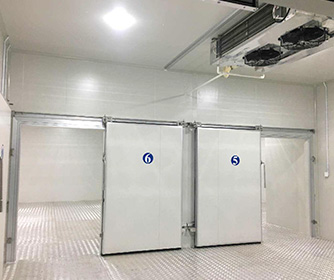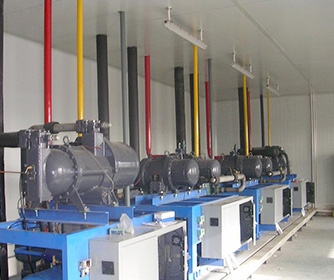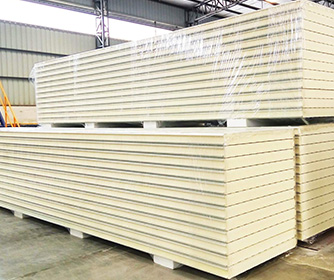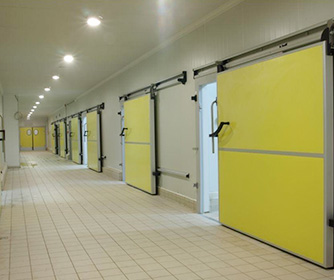In industrial applications, temperature control is crucial to ensuring consistent production quality, maintaining operational efficiency, and extending the lifespan of equipment. Industrial water chillers provide a powerful solution for cooling systems by circulating chilled water to absorb and dissipate heat generated during industrial processes. This article delves into the types, functions, benefits, and applications of water chillers for industrial use, providing a full scope of their importance in modern industry.
1. What is an Industrial Water Chiller?
An industrial water chiller is a specialized cooling device that removes heat from process water and releases it into the atmosphere or an external environment. The chiller circulates cooled water through a closed-loop system to regulate the temperature of machinery, manufacturing processes, and other industrial systems. By maintaining consistent temperatures, water chillers prevent overheating, improve productivity, and contribute to overall operational stability.
2. Types of Industrial Water Chillers
Industrial water chillers come in various types, each designed to suit specific industrial needs. The primary types are:
Air-Cooled Water Chillers: These chillers release heat through fans that cool the refrigerant by air. Air-cooled chillers are typically used outdoors or in well-ventilated areas where ambient air can help dissipate heat effectively.
Water-Cooled Water Chillers: These chillers rely on a secondary water source, often paired with a cooling tower, to absorb and dissipate heat. Water-cooled chillers are highly efficient and suitable for high-capacity cooling needs, making them ideal for large-scale industrial applications.
Portable Water Chillers: Compact and versatile, portable chillers provide localized cooling where needed. They are typically air-cooled and used for smaller industrial applications requiring mobility or temporary cooling.
3. How Does an Industrial Water Chiller Work?
The operation of an industrial water chiller involves a refrigeration cycle that consists of four main components:
Compressor: The refrigerant gas is compressed, increasing its temperature and pressure.
Condenser: The high-pressure refrigerant passes through the condenser, where it releases heat to the environment (either by air or water) and turns into a liquid.
Expansion Valve: The refrigerant expands as it passes through the valve, lowering its temperature and pressure.
Evaporator: In the evaporator, the cold refrigerant absorbs heat from the circulating water, thus cooling it down. The chilled water then circulates to the machinery or process requiring cooling.
4. Benefits of Using Industrial Water Chillers
Industrial water chillers provide several key benefits:
Enhanced Operational Efficiency: By controlling temperature, chillers ensure that equipment runs efficiently without interruptions due to overheating, reducing downtime and maintenance needs.
Cost Savings: Chillers improve energy efficiency, reduce waste, and lower cooling-related energy expenses over time, especially in high-capacity systems.
Extended Equipment Lifespan: Consistent temperature regulation prevents thermal stress on machinery, significantly extending the lifespan of critical components.
Precision Temperature Control: Modern water chillers offer precise temperature control, which is essential for sensitive processes and high-quality output in industries like pharmaceuticals, chemicals, and food processing.
5. Industrial Applications of Water Chillers
Industrial water chillers are essential in a variety of applications, including:
Manufacturing and Machining: Metalworking and CNC machining require precise temperature control to avoid deformation and maintain high product quality.
Plastics Industry: Injection molding, extrusion, and blow molding processes produce substantial heat that must be managed to ensure optimal production cycles.
Chemical and Pharmaceutical Production: Precise temperature control is critical for chemical reactions and maintaining safe, consistent quality in pharmaceuticals.
Food and Beverage Processing: In food processing, chillers are used to cool ingredients and equipment, maintaining safety and quality standards.
HVAC Systems for Large Facilities: Many industrial facilities use water chillers in HVAC systems to maintain controlled temperatures across large spaces.
6. Key Considerations When Choosing an Industrial Water Chiller
When selecting an industrial water chiller, several factors should be considered:
Cooling Capacity: The chiller’s capacity must meet the cooling requirements of the entire industrial process.
Energy Efficiency: High-efficiency chillers reduce energy costs and offer better sustainability over time.
Space and Ventilation: Determine if the chiller will be located indoors or outdoors, as air-cooled and water-cooled systems have different space and ventilation needs.
Maintenance Requirements: Choose a chiller with accessible components for easier maintenance, especially if continuous operation is required.
Conclusion
Industrial water chillers play an indispensable role in modern industrial operations by ensuring effective and reliable temperature control. Selecting the right type of chiller for specific applications can lead to significant improvements in efficiency, cost savings, and equipment longevity. As industries continue to advance, high-performance water chillers will remain essential in meeting the cooling demands of increasingly complex manufacturing processes.




